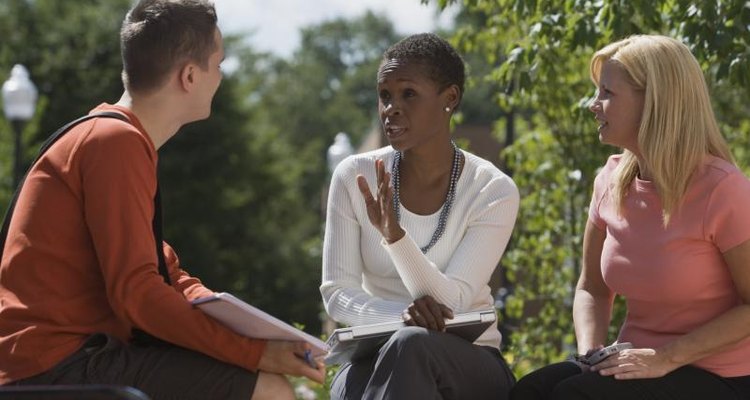
A peer facilitator helps others work through their problems by offering emotional support as well as guidance regarding different situations. Facilitators can use their life experiences to help relate to others facing similar circumstances. As they help others, peer facilitators also frequently see an increase in their own self-confidence and ability to handle conflict.
Where Peer Facilitators Serve
Peer facilitators are found in schools, social service agencies, faith communities, geographic communities, nursing homes and youth organizations. Other examples of peer facilitator programs include veteran-to-veteran peer facilitators, facilitators in mental health programs and facilitators in the work place. Facilitators may go by other names depending on where they serve. For example, peer facilitators at schools are also called peer counselors. Peer facilitating in church might be known as peer ministry, and peer mediators might be found in the work place.
The Role of Peer Facilitators
Peer facilitators work to identify problems among peers who seek them out. A facilitator in a school environment might help a fellow student adjust to a new school, deal with friendship conflict or work through a boyfriend or girlfriend issue. A facilitator in a veteran program might help another veteran work through emotions associated with their service. Facilitators offer guidance, emotional support and a listening ear. Among young people, this type of support helps reduce conflict, drug and alcohol involvement, and sexually transmitted diseases while helping enhance academic performance and service to others, according to the National Peer Helpers Association's website.
Qualities of a Peer Facilitator
No matter where peer facilitators serve, ideally they possess some similar qualities. Facilitators are genuine, and they have a genuine interest in others. Peer facilitators accept others exactly the way they are. They see everyone's ability to change and recognize positive efforts. Effective peer facilitators are good listeners who are dependable, trustworthy and approachable. They work well with others and might have a desire to give back to others experiencing obstacles similar to ones they've faced.
Training
Most facilitators are trained by peer facilitator coordinators who have undergone training from a national organization. The type and length of training for peer facilitators depend on where they'll serve, but training often includes role play and learning specific skills critical to facilitating. In addition to learning strong listening skills, facilitators will learn decision-making strategies. Depending on the environment, facilitators might also learn about drugs, alcohol and sexually transmitted diseases. Training also focuses on building a high level of trust among facilitators.
Related Articles

Qualities of a Good Role Model

Teenagers and the Importance of Friends

Types of Extrinsic Motivation

The Definition of Non-Cognitive Skills

How to Deal With a Teenage Boy That Is ...

Types Of Ministries

Similarities and Differences Between ...

Importance of the Brother Sister Bond

Caregiver Support Group Discussion ...

Positive Effects of Dating for Teenagers

A List of Formal Social Groups

How to Date Someone Who Is Codependent

The Roles of Older Siblings

Types of Social Clubs

Church Remodeling Grants

List of Teenage Help Organizations

How to Address Cross Cultural ...

What Is Transitional Housing?

How to Cope with Competitive People

Youth Mentoring Discussion Topics
References
Writer Bio
Tamara Runzel has been writing parenting, family and relationship articles since 2008. Runzel started in television news, followed by education before deciding to be a stay at home mom. She is now a mom of three and home schools her two oldest children. Runzel holds a Bachelor of Arts in communication from University of the Pacific.
Photo Credits
Jupiterimages/Stockbyte/Getty Images